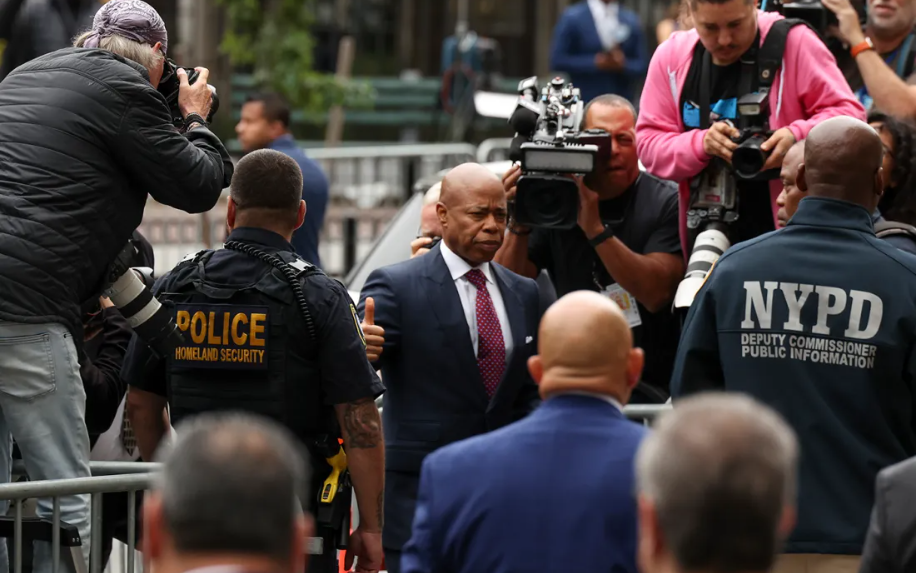
More names are expected to emerge from the investigation that led to an unprecedented five-count federal indictment against New York City Mayor Eric Adams this week, which includes allegations of bribery and illegal campaign contributions, according to a white collar crime expert.
“This is significant. It impacts not just New York, but the political landscape as a whole,” states Nikos Passas, a criminology and criminal justice professor at Northeastern University. “It demonstrates that misconduct isn’t limited to just one political party.”
The indictment comes after months of scrutiny into Adams’ close associates and years of suspicion, charging him with conspiracy to commit bribery, fraud, and soliciting illegal foreign campaign funds related to a “straw donor” scheme. This scheme allegedly involved him using a city program designed to match small donations with taxpayer funds to facilitate illicit overseas money.
He is also alleged to have accepted improper gifts from Turkish officials, using his political clout to facilitate the approval of a 36-story skyscraper for the Turkish consulate, along with other purported favors.
According to Passas, the extensive 57-page indictment containing detailed information and listing several co-conspirators indicates that more individuals will likely face charges.
“This investigation is far from finished. Many people were involved, and inquiries are still ongoing,” Passas states. “There were numerous co-conspirators, and I doubt we’ve seen the last from the prosecution, whether federally or at the state level.”
“You can anticipate that further investigations will uncover additional connections,” he adds.
If convicted on all charges, Adams could face up to 45 years in prison. He pleaded not guilty during his initial court appearance on Friday.
“The core of corruption lies in prioritizing your own private interests over the responsibilities you were elected or appointed to fulfill,” he explains. “This case involves receiving or seeking inappropriate advantages in return for political favors.”
Passas sees similarities between the Adams case and the prosecution of former President Donald Trump.
“There’s a wealth of evidence and a lot of specifics,” Passas notes. “It resembles the walking indictment we observed in Georgia against Donald Trump, which indicates a thorough investigation has already been conducted, and substantial evidence is available to the prosecution.”
Regarding the indictment, he states, “It is significant and substantial, highlighting the involvement of many individuals. They will either face indictments themselves or cooperate with the prosecutors.”
When asked if Adams should resign, as some have suggested, Passas believes the mounting evidence will increase the pressure for him to step down. However, he points out that in a political environment drastically influenced by Trump’s rule-breaking behavior, it has become common for individuals to cling to their positions. Indeed, other recent high-profile cases of corruption and fraud, particularly those involving former Sen. Bob Menendez and former U.S. Rep. George Santos, showcase varying degrees of stubbornness in the face of what many might view as compelling evidence.
“Regrettably, the level of integrity in U.S. political discourse indicates that one can lie despite clear evidence, and people will choose to believe those lies,” he remarks.
“We’re dealing with an issue of foreign influence in American politics,” Passas adds. “This is not a unique situation—it echoes the first impeachment of Trump.”
The Supreme Court has remained silent on the matter of foreign influence, which surfaced with the so-called Foreign Emoluments Clauses, provisions in the U.S. Constitution aimed at preventing presidential corruption.
“The U.S. Supreme Court chose not to clarify what constitutes emoluments, who has the right to bring charges or prosecute, or what the applicable standards are,” Passas states. “They remained uninvolved, failing to provide any clarity on the Constitution, which sets a troubling precedent for future U.S. presidents.”
Some New Yorkers have questioned whether corruption is a phenomenon unique to Manhattan. However, Passas argues that this issue is rooted in the campaign finance system itself and goes beyond partisan lines.
“This case is particularly significant because it reflects issues that extend far beyond just one instance in New York,” he explains.
“You have scandals involving both Democrats and Republicans spanning a long period,” he continues. “These straw donations in political financing reveal insights not just about Democrats and New York, but about campaign finance and corruption as a whole; they reflect broader public concerns regarding the quality of governance and political leadership in this country.”

Leave a Reply